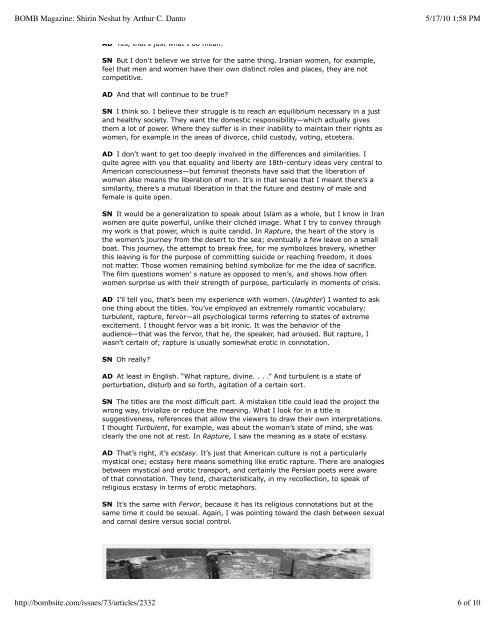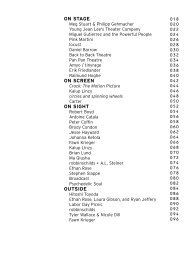BOMB Magazine: Shirin Neshat by Arthur C. Danto
BOMB Magazine: Shirin Neshat by Arthur C. Danto
BOMB Magazine: Shirin Neshat by Arthur C. Danto
Create successful ePaper yourself
Turn your PDF publications into a flip-book with our unique Google optimized e-Paper software.
SN Thank you. But I disagree with you that our idea of feminism is similar to that<br />
<strong>BOMB</strong> <strong>Magazine</strong>: <strong>Shirin</strong> <strong>Neshat</strong> of the <strong>by</strong> West. <strong>Arthur</strong> From C. my <strong>Danto</strong> understanding, Western feminism is about reaching a certain<br />
5/17/10 1:58 PM<br />
level of equality between men and women…<br />
AD Yes, that’s just what I do mean.<br />
SN But I don’t believe we strive for the same thing. Iranian women, for example,<br />
feel that men and women have their own distinct roles and places, they are not<br />
competitive.<br />
AD And that will continue to be true?<br />
SN I think so. I believe their struggle is to reach an equilibrium necessary in a just<br />
and healthy society. They want the domestic responsibility—which actually gives<br />
them a lot of power. Where they suffer is in their inability to maintain their rights as<br />
women, for example in the areas of divorce, child custody, voting, etcetera.<br />
AD I don’t want to get too deeply involved in the differences and similarities. I<br />
quite agree with you that equality and liberty are 18th-century ideas very central to<br />
American consciousness—but feminist theorists have said that the liberation of<br />
women also means the liberation of men. It’s in that sense that I meant there’s a<br />
similarity, there’s a mutual liberation in that the future and destiny of male and<br />
female is quite open.<br />
SN It would be a generalization to speak about Islam as a whole, but I know in Iran<br />
women are quite powerful, unlike their clichéd image. What I try to convey through<br />
my work is that power, which is quite candid. In Rapture, the heart of the story is<br />
the women’s journey from the desert to the sea; eventually a few leave on a small<br />
boat. This journey, the attempt to break free, for me symbolizes bravery, whether<br />
this leaving is for the purpose of committing suicide or reaching freedom, it does<br />
not matter. Those women remaining behind symbolize for me the idea of sacrifice.<br />
The film questions women’ s nature as opposed to men’s, and shows how often<br />
women surprise us with their strength of purpose, particularly in moments of crisis.<br />
AD I’ll tell you, that’s been my experience with women. (laughter) I wanted to ask<br />
one thing about the titles. You’ve employed an extremely romantic vocabulary:<br />
turbulent, rapture, fervor—all psychological terms referring to states of extreme<br />
excitement. I thought fervor was a bit ironic. It was the behavior of the<br />
audience—that was the fervor, that he, the speaker, had aroused. But rapture, I<br />
wasn’t certain of; rapture is usually somewhat erotic in connotation.<br />
SN Oh really?<br />
AD At least in English. “What rapture, divine. . . .” And turbulent is a state of<br />
perturbation, disturb and so forth, agitation of a certain sort.<br />
SN The titles are the most difficult part. A mistaken title could lead the project the<br />
wrong way, trivialize or reduce the meaning. What I look for in a title is<br />
suggestiveness, references that allow the viewers to draw their own interpretations.<br />
I thought Turbulent, for example, was about the woman’s state of mind, she was<br />
clearly the one not at rest. In Rapture, I saw the meaning as a state of ecstasy.<br />
AD That’s right, it’s ecstasy. It’s just that American culture is not a particularly<br />
mystical one; ecstasy here means something like erotic rapture. There are analogies<br />
between mystical and erotic transport, and certainly the Persian poets were aware<br />
of that connotation. They tend, characteristically, in my recollection, to speak of<br />
religious ecstasy in terms of erotic metaphors.<br />
SN It’s the same with Fervor, because it has its religious connotations but at the<br />
same time it could be sexual. Again, I was pointing toward the clash between sexual<br />
and carnal desire versus social control.<br />
http://bombsite.com/issues/73/articles/2332 6 of 10






